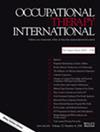“Surthriving” Hand Rehabilitation: Proposing Interventions to Support Novice Occupational Therapists Working in Underserved Contexts
IF 0.9
4区 医学
Q3 REHABILITATION
引用次数: 0
Abstract
Hand rehabilitation delivered to underserved South African communities is often the responsibility of novice or generalist occupational therapists. Novice therapists typically work with restricted supervision, support, and resources. Little is known about how these therapists should be supported in order to strengthen the services that they deliver. This study is aimed at understanding how novice occupational therapists in their first year of practice describe their experience of delivering hand rehabilitation in order to identify their support and development needs and propose interventions to address these needs. A qualitative instrumental case study design was used. Data were collected from novice occupational therapists () who participated in an online community of practice. Data collection techniques included photoelicitation, facilitated reflection activities, and case discussion. Reflexive thematic analysis was employed. Trustworthiness strategies included reflexive writing, prolonged engagement, data source triangulation, member checking, and peer audit. Analysis generated three themes: (1) “submerged: I had to drown a little” captured participants’ experience of being saturated by contextual features including poverty and poor basic management of hand injuries. (2) “Starting somewhere” captured participants’ journey of treating patients with hand injuries. They transitioned from an initial sense of having “no idea” to developing “some idea”; their clinical reasoning was challenged when working with no diagnosis, unfamiliar presentations, or when contextual features rendered traditional approaches to therapy inappropriate. Finally, (3) “dynamics of ‘surthrival’” captured elements that contributed to participants either thriving or merely surviving their hand rehabilitation experience. The proposed strategies identified in this study to address the support and development needs of novice therapists include interventions focused on systems and health services; learning opportunities to support competency and physical resources; and emotional support. Beyond application to the South African context, these strategies may be considered for supporting generalist or novice therapists delivering hand rehabilitation in other low- to middle-income countries."超越 "手部康复:提出干预措施以支持在缺乏服务的环境中工作的职业治疗师新手
向服务不足的南非社区提供的手部康复通常是新手或全才职业治疗师的责任。新手治疗师通常在有限的监督、支持和资源下工作。对于如何支持这些治疗师以加强他们提供的服务,人们知之甚少。本研究旨在了解新手职业治疗师在第一年的实践中如何描述他们提供手部康复的经验,以确定他们的支持和发展需求,并提出解决这些需求的干预措施。采用定性工具案例研究设计。数据是从参加在线实践社区的新手职业治疗师()中收集的。数据收集技术包括光激发、促进反思活动和案例讨论。采用反身性主题分析。可信度策略包括反身性写作、长期参与、数据源三角测量、成员检查和同行审计。分析产生了三个主题:(1)“淹没:我不得不淹死一点”捕捉了参与者被环境特征(包括贫困和手部受伤的基本管理不善)淹没的经历。(2)“从某处开始”记录了参与者治疗手部损伤患者的旅程。他们从最初的“没有想法”转变为“有想法”;他们的临床推理在没有诊断、不熟悉的情况下工作时受到挑战,或者当环境特征使传统的治疗方法不合适时。最后,(3)“生存动力”捕获了参与者在手部康复过程中茁壮成长或仅仅幸存下来的因素。本研究提出的解决新手治疗师支持和发展需求的策略包括:关注系统和卫生服务的干预措施;学习机会,以支持能力和物质资源;以及情感支持。除了适用于南非的情况外,这些策略可被考虑用于支持其他中低收入国家提供手部康复的全科医生或新手治疗师。
本文章由计算机程序翻译,如有差异,请以英文原文为准。
求助全文
约1分钟内获得全文
求助全文
来源期刊

Occupational Therapy International
REHABILITATION-
CiteScore
2.50
自引率
6.70%
发文量
121
审稿时长
>12 weeks
期刊介绍:
Occupational Therapy International is a peer-reviewed journal, publishing manuscripts that reflect the practice of occupational therapy throughout the world. Research studies or original concept papers are considered for publication. Priority for publication will be given to research studies that provide recommendations for evidence-based practice and demonstrate the effectiveness of a specific treatment method. Single subject case studies evaluating treatment effectiveness are also encouraged. Other topics that are appropriate for the journal include reliability and validity of clinical instruments, assistive technology, community rehabilitation, cultural comparisons, health promotion and wellness.
 求助内容:
求助内容: 应助结果提醒方式:
应助结果提醒方式:


